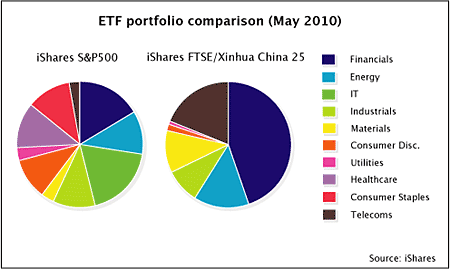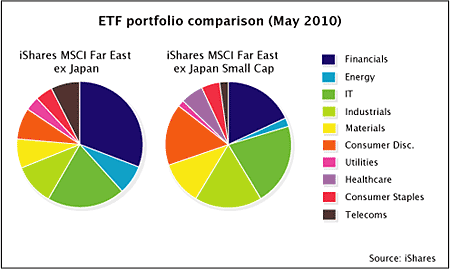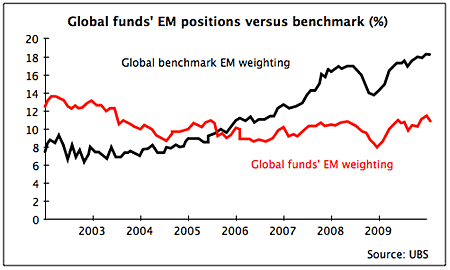Three ways to invest in the Asian consumer
The American consumer dominated the economic landscape of the end of the 20th century. But the 21st century will belong to the Asian consumer. However, taking advantage of this fact may not be as simple as it sounds. Here, Cris Sholto Heaton outlines your three main options.

Get the latest financial news, insights and expert analysis from our award-winning MoneyWeek team, to help you understand what really matters when it comes to your finances.
You are now subscribed
Your newsletter sign-up was successful
Want to add more newsletters?

Twice daily
MoneyWeek
Get the latest financial news, insights and expert analysis from our award-winning MoneyWeek team, to help you understand what really matters when it comes to your finances.

Four times a week
Look After My Bills
Sign up to our free money-saving newsletter, filled with the latest news and expert advice to help you find the best tips and deals for managing your bills. Start saving today!
The US consumer defined the last few decades. The Asian consumer will define the next. As hundreds of millions of people suddenly have spending power for the first time, sales of goods from cosmetics to cars, and toothpaste to TVs, are set to just grow and grow across the region.
This is a great opportunity for investors. As I discussed in detail here, history suggests that many of these sectors are the ones that deliver the best rewards for shareholders in the long run. Technology may be glamorous but shampoo and ready meals will make you rich.
But how do you invest in the Asian consumer? It's not as simple as it sounds but you have three main options
MoneyWeek
Subscribe to MoneyWeek today and get your first six magazine issues absolutely FREE

Sign up to Money Morning
Don't miss the latest investment and personal finances news, market analysis, plus money-saving tips with our free twice-daily newsletter
Don't miss the latest investment and personal finances news, market analysis, plus money-saving tips with our free twice-daily newsletter
Investing via a consumer-focused fund
Most investors in Asia will begin by buying a specialist Asia fund. This is where the problem for anyone who wants to invest in the consumer story becomes obvious.
Emerging market share indices and funds tend to be light on sectors such as consumer goods and healthcare, and heavy on cyclical industrial stocks. I looked at this in more detail in an earlier article (Be wary when buying emerging market ETFs). But the chart below sums the situation up. It shows the sector breakdown for the US S&P 500 index and the FTSE/Xinhua China 25.

As you can see, no fund based on this Chinese index will have much consumer exposure. There is a heavy weighting in financials, which should be a major long-term growth sector. But there are big question marks over the quality of Chinese banks. And much of the rest of the index is comprised of highly cyclical industrials. History suggests these are unlikely to reward shareholders in the long run.
Little here appeals to me as a long-term investment. This often happens with emerging markets. They tend to be unbalanced in terms of sectors, and full of companies that are badly run, subject to political influence, or have a controlling shareholder who has little regard for minority investors.
So do any funds specialise in consumer themes? Not really. I know of a couple of dedicated emerging market consumer funds, but these are aimed at institutional investors only and have very high minimum investments.
In developed markets, plenty of themed exchange-traded funds (ETFs) are available. This sort of focused product hasn't yet arrived for emerging markets. But we're likely to see more launched as the Asian consumer theme becomes more and more mainstream. Indices such as the MSCI Emerging Market Asia benchmark already have sub-indices such as consumer staples and healthcare, which ETFs could track. But I'm not aware of any launches planned for the near future.
The best we can do is to look for funds and ETFs that have the highest weighting towards the sectors we want. Often, this means overlooking the ones based on the main market and focusing on small cap funds. For example, the MSCI Far East ex Japan Smallcap index has a substantially higher weighting in consumer sectors, than the main MSCI Far East ex Japan benchmark.

The other option is to look for managers who favour a consumer theme in their funds. Neither is a perfect solution. I'd prefer to have funds that have a specific consumer mandate. But it does mean that your portfolio will be more weighted towards what I believe are likely to be top-performing long-term sectors.
Expert tips & advice for investing in Asia! Claim your FREE guides from MoneyWeek that include:
- How to go about investing to Asia
- Which brokers to use to buy foreign shares
The table below shows some ETFs and funds that have a reasonable weighting towards consumer themes (I'm including healthcare in this).
table.ben-table table { border: 1px solid #2b1083;font: verdana, arial, sans-serif; }
th { background: #2b1083; padding: 2px 1px;color: white;font-weight: bold;text-align: center;border-left: 1px solid #a6a6c9; font-size: .8em;}th.first { border-left: 0; padding: 2px 1px;text-align: left; font-size: .8em;}
tr {background: #fff;}
tr.alt {background: #f6f5f9; }
td { padding: 2px 1px;text-align: center;border-left: 1px solid #a6a6c9;color: #000;vertical-align: center; font-size: .8em;}td.alt { background-color: #f6f5f9; }
td.bold { font-weight: bold;}td.first { text-align: left; }
td.left { text-align: left; }
| China | Global X China Consumer | US:CHIQ | 100 | 0.65 |
| China | Atlantis China Healthcare (min $10,000) | Row 1 - Cell 2 | 100 | 1.66 |
| China | China Fund | US:CHN | 48 | 1.44 |
| Indonesia | Aberdeen Indonesia | US:IF | 47 | 1.57 |
| Region | Scottish Oriental Smaller Companies | LN:SST | 40 | 1.04 |
| China | Morgan Stanley China A Share | US:CAF | 38 | 1.74 |
| Malaysia | Malaysia Fund | US:MAY | 35 | 1.16 |
| Korea | Korea Equity Fund | US:KEF | 34 | 1.64 |
| India | Morgan Stanley India | US:IIF | 33 | 142.00 |
| Thailand | Aberdeen New Thai | LN:ANW | 29 | 1.80 |
| India | Aberdeen New India | LN:NII | 29 | 1.80 |
| Region | Fidelity Asian Values | LN:FAS | 28 | 1.34 |
| China | Templeton Dragon Fund | US:TDF | 27 | 1.50 |
| Malaysia | iShares MSCI Malaysia | US:EWM | 26 | 0.56 |
| Region | iShares MSCI Far East ex Japan SmallCap | LN:ISFE | 26 | 0.74 |
| Thailand | Thai Fund | US:TTF | 26 | 1.77 |
| Thailand | Thai Capital Fund | US:TF | 25 | 2.55 |
| Indonesia | Market Vectors Indonesia | US:IDX | 25 | 0.68 |
| China | Claymore/AlphaShares China Small Cap | US:HAO | 25 | 0.70 |
| Region | Pacific Assets | LN:PAC | 23 | 1.70 |
Be aware that the 'consumer' classification used in funds is quite broad. It can include industries such as autos and electronic components, as well as toothpaste or luxury goods. So you should always look at these in more detail and decide whether you're happy with what they hold before buying.
In most cases, you'll be able to find details on a funds website such asMorningstar,Trustnet, theClosed-end Funds Association (for the US-listed funds), or on the management companies' websites.
Buy developed world companies with emerging world exposure
The second solution is useful for conservative investors who'd like to get some exposure to these growth themes. Several high-quality large cap stocks listed in the developed world have major emerging markets businesses.
The table below shows 20 such stocks that fit with the emerging consumer theme. The sales estimates are rough in many cases some firms are much better about giving regional breakdowns than others but should be in the right area. If Prudential's deal to buy AIG Asian insurance businesses goes through, it will become a useful addition to this list, but since that's unclear I haven't included it for the moment.
| Standard Chartered | Financials | LN:STAN | 81 | 95 |
| Swatch | Luxury goods | CH:UHR | 41 | 38 |
| Richemont | Luxury goods | CH:CFR | 39 | 34 |
| Yum Brands | Restaurants | US:YUM | 40 | 45 |
| HSBC | Financials | LN:HSBA | 26 | 39 |
| Philip Morris | Tobacco | US:PM | 25 | 60 |
| British American Tobacco | Tobacco | LN:BATS | 22 | 63 |
| Beiersdorf | Healthcare | DE:BEI | 20 | 25 |
| Associated British Foods | Food and beverages | LN:ABF | 19 | 35 |
| SABMiller | Food and beverages | LN:SAB | 18 | 79 |
| Colgate Palmolive | Household | US:CL | 17 | 33 |
| WPP | Advertising | LN:WPP | 17 | 29 |
| Unilever | Household | LN:ULVR | 17 | 35 |
| Bayer | Healthcare | DE:BAYA | 16 | 29 |
| PZ Cussons | Household | LN:PZC | 16 | 45 |
| JC Decaux | Advertising | FP:DEC | 15 | 34 |
| Johnson & Johnson | Household | US:JNJ | 15 | 25 |
| Tesco | Retail | LN:TSCO | 13 | 25 |
| Baxter | Healthcare | US:BAX | 13 | 20 |
| Nestle | Food and beverages | CH:NESN | 12 | 33 |
There are some advantages to investing in such stocks. Their developed market roots mean that you can be fairly sure that there are no corporate governance problems. They're diversified across a number of countries, which means they aren't so vulnerable to any country-specific economic problems. And because they are established stocks, they typically offer a reasonable dividend at the same time as having some growth potential from their emerging market units.
What are the disadvantages? The growth potential is obviously limited they're not going to double their earnings in five years. They're all pretty well-known stocks. And no-one is going to get overexcited about them and bid them up to bubble valuations.
So the upside is limited. They could produce decent returns, but you're highly unlikely to buy something that delivers a 500% gain here. It's also worth remembering that if developed economies are sluggish for many years, the firms' high exposure to these markets may be a drag on profits. That seems especially likely in sectors such as luxury goods.
Why you should think about investing directly
That brings us to the final option investing directly in consumer-oriented emerging market stocks. Clearly this is the riskiest option, although you can substantially reduce the risk by having a diversified portfolio of 20-40 stocks. Underdiversify and you run unnecessary risks, overdiversify and you spread yourself too thin and almost guarantee average returns (see this week's MoneyWeek magazine, out on Friday, for more on diversification).
But there are clear advantages too. First, you're investing in stocks that are completely geared to these themes, rather than having a certain amount of exposure to them. Second, there's the potential for these stocks to get carried away into a bubble if an emerging markets mania takes off at some point in the next few years, as I suspect it will.
The lure of high growth emerging markets versus the sluggish developed world is obvious, even if the relationship between stockmarket returns and growth isn't clear-cut. And while emerging markets are becoming more popular, they're certainly not yet a mainstream investment. So there is still a long way for them to grow.
For example, the gap between the share of assets that global equity funds have in emerging markets and the share of emerging markets in the global benchmark is actually getting wider. That suggests a significant number of managers and investors haven't yet been won round to the idea of emerging market investing. As they are, more money will flow into emerging market shares, pushing up valuations.

Buying into carefully picked emerging market stocks ahead of the crowd is likely to deliver the best returns. Individual investors can have a big advantage here. Managers usually have to invest in stocks with minimum market capitalisations or levels of liquidity. Some even have a formal 'approved list' that sets down specific stocks they can chose from.
A private investor free of these restrictions can pick from small and medium-sized stocks that are still under the radar for most funds, and while their best prospects are still ahead of them. The difficulty for most UK investors is stockpicking, given that most Asian firms are not very familiar especially these less well-known ones where the best opportunities lie.
So I'm pleased to say that I'm about to launch a newsletter specifically about these kinds of opportunities. I've been working on this for some months and I've mentioned it a few times in MoneyWeek Asia. Finally it's almost ready to go.
The letter will focus on the themes I believe have the best long-term return potential: consumer goods, healthcare, education, infrastructure and high-quality financials. I'll be mostly recommending stocks in Hong Kong and Singapore, with a few UK and US-listed tips. Everything will be available through a low-cost discount broker, such as TD Waterhouse*.
I have a number of very promising ideas lined up, including a play on China's changing snacking habits and a way to invest in the coming bulge in middle-class savers.
This article is from MoneyWeek Asia, a FREE weekly email of investment ideas and news every Monday from MoneyWeek magazine, covering the world's fastest-developing and most exciting region. Sign up to MoneyWeek Asia here
* Please note: MoneyWeek's group of companies receives commission from TD Waterhouse.
Get the latest financial news, insights and expert analysis from our award-winning MoneyWeek team, to help you understand what really matters when it comes to your finances.

Cris Sholt Heaton is the contributing editor for MoneyWeek.
He is an investment analyst and writer who has been contributing to MoneyWeek since 2006 and was managing editor of the magazine between 2016 and 2018. He is experienced in covering international investing, believing many investors still focus too much on their home markets and that it pays to take advantage of all the opportunities the world offers.
He often writes about Asian equities, international income and global asset allocation.
-
 Early signs of the AI apocalypse?
Early signs of the AI apocalypse?Uncertainty is rife as investors question what the impact of AI will be.
-
 Reach for the stars to boost Britain's space industry
Reach for the stars to boost Britain's space industryopinion We can’t afford to neglect Britain's space industry. Unfortunately, the government is taking completely the wrong approach, says Matthew Lynn